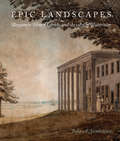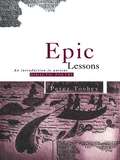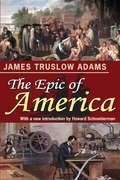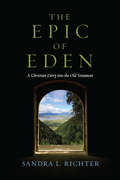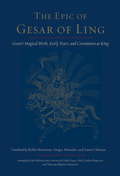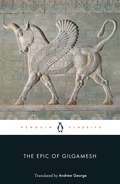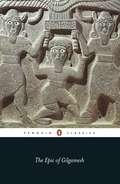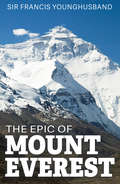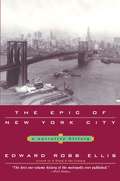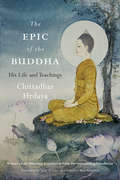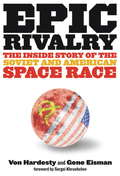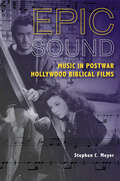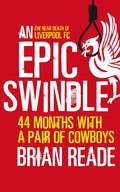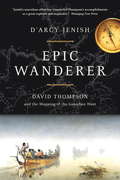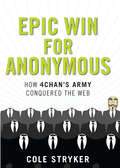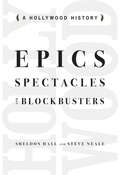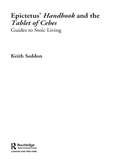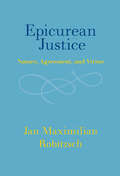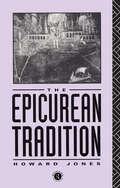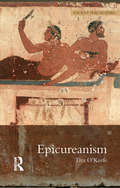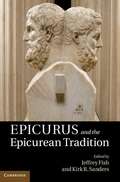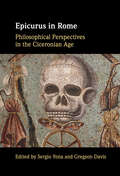- Table View
- List View
Epic Landscapes: Benjamin Henry Latrobe and the Art of Watercolor
by Julia A. SienkewiczWinner of College Art Association’s Wyeth Foundation for American Art Publication Grant Epic Landscapes is the first study devoted to architect Benjamin Henry Latrobe’s substantial artistic oeuvre from 1795, when he set sail from Britain to Virginia, to late 1798, when he relocated to Pennsylvania. Thus, this book offers the only extended consideration of Latrobe’s Virginian watercolors, including a series of complex trompe l’oeil studies and three significant illustrated manuscripts. Though Latrobe’s architecture is well known, his watercolors have received little critical attention. Epic Landscapes rediscovers Latrobe’s watercolors as an ambitious body of work and reconsiders the close relationship between the visual and spatial sensibility of these images and his architectural designs. It also offers a fresh analysis of Latrobe within the context of creative practice in the Atlantic world at the end of the eighteenth century as he explored contemporary ideas concerning the form of art for Republican society and the social impacts of revolution.
Epic Lessons: An Introduction to Ancient Didactic Poetry
by Peter TooheyDidactic Epic was enormously popular in the ancient world. It was used to teach Greeks and Romans technical and scientific subjects, but in verse. Epic Lessons shows how this scientific poetry was intended not just to instruct but also to entertain.Praise for its predecessor, Reading Epic'Toohey's erudition makes the complexities and the strangeness of these ancient poems appear as clear as daylight and his enthusiasm renders them as attractive as the latest blockbuster.' - JACT Review
The Epic of America
by James Truslow AdamsThere is a tradition of one-volume narrative histories of the United States in which the political, military, diplomatic, social, and economic strands are skillfully interwoven. Rather than add to these volumes, The Epic of America paints a sweeping picture of the diverse past that has created America's national story. In this important narrative, James Truslow Adams reviews how the ordinary American has matured over time in outlook, character, and opinion.Adams grew increasingly conscious of how different an American is now from the man or woman of any other advanced nation. He is equally interested in the whole of American history, how it began, and what it represented in the first half of the twentieth century. Adams traces the historical origins of the American concept of "bigger and better," attitudes toward business, the American Dream, and other characteristics generally considered "typically American."Ever since America became an independent nation, each generation has seen an uprising of its citizens to save the American Dream from forces seeking to overwhelm and dispel it. Possibly the greatest of these struggles is still ahead not a struggle of revolutionists against established order, but of the ordinary person who seeks to hold fast to the rights of "life, liberty, and the pursuit of happiness." This classic book is valuable for a new age and as important for this new century as it was when originally written.
The Epic of Eden: A Christian Entry into the Old Testament
by Sandra L. RichterDoes your knowledge of the Old Testament feel like a grab bag of people, books, events and ideas? How many times have you resolved to really understand the OT? To finally make sense of it? Perhaps you are suffering from what Sandra Richter calls the "dysfunctional closet syndrome." If so, she has a solution. Like a home-organizing expert, she comes in and helps you straighten up your cluttered closet. Gives you hangers for facts. A timeline to put them on. And handy containers for the clutter on the floor. Plus she fills out your wardrobe of knowledge with exciting new facts and new perspectives. The whole thing is put in usable order--a history of God's redeeming grace. A story that runs from the Eden of the Garden to the garden of the New Jerusalem. Whether you are a frustrated do-it-yourselfer or a beginning student enrolled in a course, this book will organize your understanding of the Old Testament and renew your enthusiasm for studying the Bible as a whole.
The Epic of Gesar of Ling: Gesar's Magical Birth, Early Years, and Coronation as King
by Robin Kornman Sakyong Mipham Sangye Khandro Alak Zenkar Rinpoche Lama ChonamThe epic of Gesar has been the national treasure of Tibet for almost a thousand years. An open canon of tales about a superhuman warrior-king, the epic is still a living oral tradition, included on UNESCO's Representative List of the Intangible Cultural Heritage of Humanity. This book is a translation of the beginning portion of this enormous corpus, covering all the events from Gesar's divine conception to his human birth and mischievous childhood to his coronation as king of Ling.Born in the pure lands the son of two wisdom deities, Gesar takes rebirth in the human realm in order to defeat the demon kings who had taken over the empires of Asia and to thus liberate the people from suffering. His jealous uncle Trothung proves to be the first major threat to this goal, but Gesar outwits him every time using magic. In the last chapters of the book, he and Trothung's son face off in a high-tension horse race to decide who will win the throne of Ling and the hand of the coveted Princess Drugmo in marriage.Gesar's story is popularly read as an allegory, with Gesar representing the ideal of spiritual warriorship--that is, fearlessness in the face of obstacles on the path to enlightenment. Just as Gesar rides his flying steed, we too can ride the energy of dignity, confidence, and power that is inherent to us, subduing inner demons and claiming victory.
The Epic of Gilgamesh
by Anonymous AnonymousThe ancient Sumerian poem The Epic of Gilgamesh is one of the oldest written stories in existence, translated with an introduction by Andrew George in Penguin Classics.Miraculously preserved on clay tablets dating back as much as four thousand years, the poem of Gilgamesh, king of Uruk, is the world's oldest epic, predating Homer by many centuries. The story tells of Gilgamesh's adventures with the wild man Enkidu, and of his arduous journey to the ends of the earth in quest of the Babylonian Noah and the secret of immortality. Alongside its themes of family, friendship and the duties of kings, The Epic of Gilgamesh is, above all, about mankind's eternal struggle with the fear of death.The Babylonian version has been known for over a century, but linguists are still deciphering new fragments in Akkadian and Sumerian. Andrew George's gripping translation brilliantly combines these into a fluid narrative and will long rank as the definitive English Gilgamesh. If you enjoyed The Epic of Gilgamesh, you might like Homer's Iliad, also available in Penguin Classics.'A masterly new verse translation'The Times'Andrew George has skilfully bridged the gap between a scholarly re-edition and a popular work'London Review of Books
The Epic of Gilgamesh
by N. K. SandarsGilgamesh, King of Uruk, and his companion Enkidu are the only heroes to have survived from the ancient literature of Babylon, immortalized in this epic poem that dates back to the 3rd millennium BC. Together they journey to the Spring of Youth, defeat the Bull of Heaven and slay the monster Humbaba. When Enkidu dies, Gilgamesh's grief and fear of death are such that they lead him to undertake a quest for eternal life. A timeless tale of morality, tragedy and pure adventure, The Epic of Gilgamesh is a landmark literary exploration of man's search for immortality.
The Epic of Mount Everest: The Historic Account Of Mallory's Expeditions
by Sir Francis YounghusbandThe Epic of Mount Everest, first published in 1926, is the exciting story of the first attempts to reach the summit of Mount Everest, including that of George Mallory and Andrew Irvine, who disappeared and died in the 1924 expedition. Considered “must reading” for mountaineers, The Epic of Mount Everest provides a fascinating insight into the men, methods, and struggles of early mountain-climbers. Included are 15 pages of illustrations and 2 maps.
The Epic of New York City: A Narrative History
by Edward Robb EllisIn swift, witty chapters that flawlessly capture the pace and character of New York City, acclaimed diarist Edward Robb Ellis presents his masterpiece: a thorough, and thoroughly readable, history of America's largest metropolis. Ellis narrates some of the most significant events of the past three hundred years and more--the Revolutionary and Civil Wars, Alexander Hamilton and Aaron Burr's fatal duel, the formation of the League of Nations, the Great Depression--from the perspective of the city that experienced, and influenced, them all. Throughout, he infuses his account with the strange and delightful anecdotes that a less charming tour guide might omit, from the story of the city's first, block-long subway to that of the blizzard of 1888 that turned Macy's into one big slumber party. Playful yet authoritative, comprehensive yet intimate, The Epic of New York City confirms the words of its own epigraph, spoken by Oswald Spengler: "World history is city history," particularly when that city is the Big Apple.
The Epic of the Buddha: His Life and Teachings (Harvard Oriental Ser. #67)
by Chittadhar HrdayaA translation of the modern Nepalese classic Winner of the Toshihide Numata Book Award in Buddhism and the Khyentse Foundation Prize for Outstanding Translation This award-winning book contains the English translation of Sugata Saurabha (“The Sweet Fragrance of the Buddha”), an epic poem on the life and teachings of the Buddha. Chittadhar Hṛdaya, a master poet from Nepal, wrote this tour de force while imprisoned for subversion in the 1940s and smuggled it out over time on scraps of paper. His consummate skill and poetic artistry are evident throughout as he tells the Buddha’s story in dramatic terms, drawing on images from the natural world to heighten the description of emotionally charged events. It is peopled with very human characters who experience a wide range of emotions, from erotic love to anger, jealousy, heroism, compassion, and goodwill. By showing how the central events of the Buddha’s life are experienced by Siddhartha, as well as by his family members and various disciples, the poem communicates a fuller sense of the humanity of everyone involved and the depth and power of the Buddha’s loving-kindness. For this new edition of the English translation, the translators improved the beauty and flow of most every line. The translation is also supplemented with a series of short essays by Todd Lewis, one of the translators, that articulates how Hṛdaya incorporated his own Newar cultural traditions in order to connect his readership with the immediacy and relevancy of the Buddha’s life and at the same time express his views on political issues, ethical principles, literary life, gender discrimination, economic policy, and social reform.
Epic Rivalry: The Inside Story of the Soviet and American Space Race
by Gene Eisman Von HardestyWhen Neil Armstrong and Buzz Aldrin walked on the moon in 1969, they personified an almost unimaginable feat-the incredibly complex task of sending humans safely to another celestial body. This extraordinary odyssey, which grew from the rivalry between the United States and the Soviet Union during the Cold War, was galvanized by the Sputnik launch in 1957. To mark the fiftieth anniversary of Sputnik, National Geographic recaptures this gripping moment in the human experience with a lively and compelling new account. Written by Smithsonian curator Von Hardesty and researcher Gene Eisman, Epic Rivalry tells the story from both the American and the Russian points of view, and shows how each space-faring nation played a vital role in stimulating the work of the other. Scores of rare, unpublished, and powerful photographs recall the urgency and technical creativity of both nations' efforts. The authors recreate in vivid detail the "parallel universes" of the two space exploration programs, with visionaries Wernher von Braun and Sergei Korolev and political leaders John F. Kennedy and Nikita Khrushchev at the epicenters. The conflict between countries, and the tense drama of their independent progress, unfolds in vivid prose. Approaching its subject from a uniquely balanced perspective, this important new narrative chronicles the epic race to the moon and back as it has never been told before-and captures the interest of casual browsers and science, space, and history enthusiasts alike.
Epic Rivalry: Inside the Soviet and American Space Race
by Von HardestyWhen Neil Armstrong and Buzz Aldrin walked on the moon in 1969, they personified an almost unimaginable feat - the incredibly complex task of sending humans safely to another celestial body. This extraordinary odyssey, which grew from the rivalry between the United States and the Soviet Union during the Cold War, was galvanized by the Sputnik launch in 1957. Written by Smithsonian curator Von Hardesty and researcher Gene Eisman, Epic Rivalry tells the story from both the American and the Russian points of view, and shows how each space-faring nation played a vital role in stimulating the work of the other. Scores of rare, unpublished, and powerful photographs recall the urgency and technical creativity of both nations' efforts. The authors recreate in vivid detail the parallel universes of the two space exploration programs, with visionaries Wernher von Braun and Sergei Korolev and political leaders John F. Kennedy and Nikita Khrushchev at the epicenters. The conflict between countries, and the tense drama of their independent progress, unfolds in vivid prose. Approaching its subject from a uniquely balanced perspective, this important new narrative chronicles the epic race to the moon and back as it has never been told before, and captures the interest of casual browsers and science, space, and history enthusiasts alike.
Epic Sound: Music In Postwar Hollywood Biblical Films
by Stephen C. MeyerLavish musical soundtracks contributed a special grandeur to the new widescreen, stereophonic sound movie experience of postwar biblical epics such as Samson and Delilah, Ben-Hur, and Quo Vadis. In Epic Sound, Stephen C. Meyer shows how music was utilized for various effects, sometimes serving as a vehicle for narrative plot and at times complicating biblical and cinematic interpretation. In this way, the soundscapes of these films reflected the ideological and aesthetic tensions within the genre, and more generally, within postwar American society. By examining key biblical films, Meyer adeptly engages musicology with film studies to explore cinematic interpretations of the Bible during the 1940s through the 1960s.
An Epic Swindle
by Brian ReadeAN EPIC SWINDLE is the inside story of how Liverpool FC came within hours of being re-possessed by the banks after the shambolic 44-month reign of American owners Tom Hicks and George Gillett. It is the tale of a civil war that dragged Britain's most successful football club to its knees, through the High Court and almost into administration. Players Steven Gerrard and Jamie Carragher tell of their anger at the broken promises, as well as their pain at watching loyal fans in open revolt. Manager, chief executive, board members, leading fans and journalists reveal the turmoil at a revered sporting institution run by two men at war with each other, who trampled Liverpool's cherished traditions into the gutter. No story sums up the naked greed at the heart of modern football quite like Hicks' and Gillett's attempt to turn a buck at Liverpool. No-one has had as much access to the truth, or tells it with as much passion, wit and insight as Brian Reade. bAN EPIC SWINDLE is the riveting story of how close one of the great football clubs came to financial implosion. b
Epic Wanderer
by D'Arcy JenishPopular historian D'Arcy Jenish recreates the adventure and sacrifice of mapmaker David Thompson's fascinating life in the wilderness of North America.Epic Wanderer, the first full-length biography of David Thompson, is set in the late eighteenth and early nineteenth centuries against a broad canvas of dramatic rivalries -- between the United States and British North America, between the Hudson's Bay Company and its Montreal-based rival, the North West Co., and between the various First Nations thrown into disarray by the advent of guns, horses and alcohol.Less celebrated than his contemporaries Lewis and Clark, Thompson spent nearly three decades (1784-1812) surveying and mapping over 1.2 million square miles of largely uncharted Indian territory. Travelling across the prairies, over the Rockies and on to the Pacific, Thompson transformed the raw data of his explorations into a map of the Canadian West. Measuring ten feet by seven feet, and laid out with astonishing accuracy, the map became essential to the politicians and diplomats who would decide upon the future of the rich and promising lands of the West. Yet its creator worked without personal glory and died in penniless obscurity.Drawing extensively on David Thompson's personal journals, illustrated with his detailed sketches, intricate notebook pages and the map itself, Epic Wanderer charts the life of a man who risked everything in the name of scientific advancement and exploration.From the Hardcover edition.
Epic Win For Anonymous: How 4chan's Army Conquered the Web
by Cole StrykerEpic Win for Anonymous is the first book to tell the story of the genesis of the rogue protest groups—including Anonymous, LulzSec, and AntiSec– currently changing our world. Longtime Web culture critic Cole Stryker traces their growing importance to mainstream news, community activism, and new creative media. Starting with the "anti-Facebook," the web community at 4chan. org, the book follows the evolution of Internet culture from humorous memes to political game-changers. Whether chronicling how Sarah Palin’s personal email account was hacked or dissecting the threat of cyber-bullying, Stryker’s engrossing and approachable book proves the transformative cultural impact of the Internet and the communities it sustains. .
Epics, Spectacles, and Blockbusters: A Hollywood History
by Steve Neale Sheldon HallConsiders the history of the American blockbuster--the large-scale, high-cost film--as it evolved from the 1890s to today.
Epictetus' Handbook and the Tablet of Cebes: Guides to Stoic Living
by Keith SeddonThis new translation presents two works, one by Epictetus and the other by Cebes, two ancient Greek philosophers of the Imperial period, in new translations of clear, straightforward English. In this book, readers will learn how to sustain emotional harmony and a ‘good flow of life’ whatever fortune may hold in store for them. This modern English translation of the complete Handbook is supported by and includes: * the first thorough commentary since that of Simplicius, 1500 years ago* a detailed introduction* extensive glossary* index of key terms* chapter-by-chapter discussion of themes* helpful tables that clarify Stoic ethical doctrines as a glance. Accompanying the Handbook is the Tablet of Cebes, a curious and engaging text. In complete contrast, yet complementing the Handbook’s more conventional philosophical presentation, the Tablet shows progress to philosophical wisdom as a journey through a landscape inhabited by personifications of happiness, fortune, the virtues and vices.
Epicurean Justice: Nature, Agreement, and Virtue
by null Jan Maximilian RobitzschThe ancient Greek philosopher Epicurus and his followers advanced a sophisticated theory of justice that occupied a middle position between Plato and Aristotle, on the one hand, and some Sophists, on the other. They held that justice is neither fully natural nor fully conventional, that there is a robust virtue of justice, and that it is always better to be just than to be unjust, but it is not always better to obey the laws. In this book, the first English-language monograph on the topic, Jan Maximilian Robitzsch draws on a range of sources including papyrological evidence to give a comprehensive account of Epicurean justice. He shows how it relates to Epicurean philosophy as a whole and discusses to what extent it can be seen to anticipate modern positions such as contractarianism and legal positivism.
Epicurean Tradition
by Howard JonesFirst published in 1992. Routledge is an imprint of Taylor & Francis, an informa company.
Epicureanism (Ancient Philosophies #7)
by Tim O'KeefeThe Epicurean school of philosophy was one of the dominant philosophies of the Hellenistic period. Founded by Epicurus of Samos (century 341-270 BCE) it was characterized by an empiricist epistemology and a hedonistic ethics. This new introduction to Epicurus offers readers clear exposition of the central tenets of Epicurus' philosophy, with particular stress placed on those features that have enduring philosophical interest and where parallels can be drawn with debates in contemporary analytic philosophy. Part 1 of the book examines the fundamentals of Epicurus' metaphysics, including atoms and the void, emergent and sensible properties, cosmology, mechanistic biology, the nature and functioning of the mind, death, and freedom of action. Part 2 explores Epicurus' epistemology, including his arguments against scepticism and his ideas on sensations, preconceptions and feelings. The final part deals with Epicurus' ethics, exploring his arguments for hedonism, his distinctive conceptions of types of pleasure and desire, his belief in virtue, his notions of justice, friendship and his theology. O'Keefe provides extended exegesis of the arguments supporting Epicurus' positions, indicating their strengths and weaknesses, while showing the connections between the various parts of his philosophy and how Epicureanism hangs together as a whole.
Epicureans and Atheists in France, 1650–1729
by Alan Charles KorsAtheism was the most foundational challenge to early-modern French certainties. Theologians and philosophers labelled such atheism as absurd, confident that neither the fact nor behaviour of nature was explicable without reference to God. The alternative was a categorical naturalism, whose most extreme form was Epicureanism. The dynamics of the Christian learned world, however, which this book explains, allowed the wide dissemination of the Epicurean argument. By the end of the seventeenth century, atheism achieved real voice and life. This book examines the Epicurean inheritance and explains what constituted actual atheistic thinking in early-modern France, distinguishing such categorical unbelief from other challenges to orthodox beliefs. Without understanding the actual context and convergence of the inheritance, scholarship, protocols, and polemical modes of orthodox culture, the early-modern generation and dissemination of atheism are inexplicable. This book brings to life both early-modern French Christian learned culture and the atheists who emerged from its intellectual vitality.
Epicurus and the Epicurean Tradition
by Kirk R. Sanders Jeffrey FishEpicureanism after the generation of its founders has been characterised as dogmatic, uncreative and static. But this volume brings together work from leading classicists and philosophers that demonstrates the persistent interplay in the school between historical and contemporary influences from outside the school and a commitment to the founders' authority. The interplay begins with Epicurus himself, who made arresting claims of intellectual independence, yet also admitted to taking over important ideas from predecessors, and displayed more receptivity than is usually thought to those of his contemporaries. The same principles of autonomy and openness figure importantly in the three major areas of focus in these essays: theology, politics and the emotions.
Epicurus in Rome: Philosophical Perspectives in the Ciceronian Age
by Sergio Yona Gregson DavisThe role of Greek thought in the final days of the Roman republic is a topic that has garnered much attention in recent years. This volume of essays, commissioned specially from a distinguished international group of scholars, explores the role and influence of Greek philosophy, specifically Epicureanism, in the late republic. It focuses primarily (although not exclusively) on the works and views of Cicero, premier politician and Roman philosopher of the day, and Lucretius, foremost among the representatives and supporters of Epicureanism at the time. Throughout the volume, the impact of such disparate reception on the part of these leading authors is explored in a way that illuminates the popularity as well as the controversy attached to the followers of Epicurus in Italy, ranging from ethical and political concerns to the understanding of scientific and celestial phenomena.
Epicurus in Rome: Philosophical Perspectives in the Ciceronian Age
by Sergio Yona Gregson DavisThe role of Greek thought in the final days of the Roman republic is a topic that has garnered much attention in recent years. This volume of essays, commissioned specially from a distinguished international group of scholars, explores the role and influence of Greek philosophy, specifically Epicureanism, in the late republic. It focuses primarily (although not exclusively) on the works and views of Cicero, premier politician and Roman philosopher of the day, and Lucretius, foremost among the representatives and supporters of Epicureanism at the time. Throughout the volume, the impact of such disparate reception on the part of these leading authors is explored in a way that illuminates the popularity as well as the controversy attached to the followers of Epicurus in Italy, ranging from ethical and political concerns to the understanding of scientific and celestial phenomena. This title is also available as Open Access on Cambridge Core.
